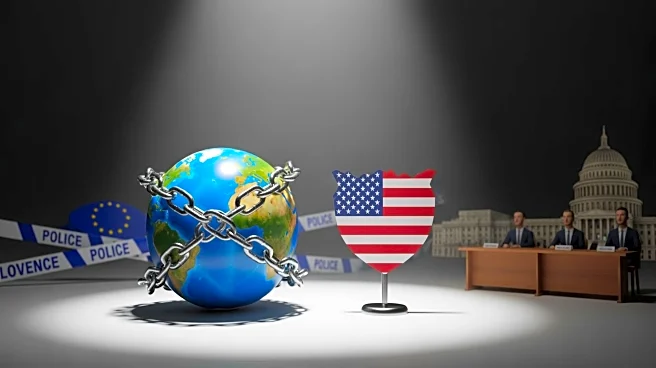What's Happening?
The European Union has joined the United States in imposing additional economic sanctions on Russia, targeting the Russian oil industry and other sectors. These measures are part of a broader strategy to cut off revenue streams that support Moscow's military
operations in Ukraine and to compel Russian President Vladimir Putin to engage in peace negotiations. The sanctions, which include bans on Russian liquefied natural gas imports and restrictions on Russian payment systems, aim to weaken Russia's economic foundation. Ukrainian President Volodymyr Zelenskyy has welcomed these actions, viewing them as a significant step in the international community's efforts to hold Russia accountable for its invasion of Ukraine.
Why It's Important?
The sanctions are significant as they represent a coordinated effort by Western nations to exert economic pressure on Russia, potentially impacting its ability to sustain military operations in Ukraine. By targeting key sectors such as oil and gas, the sanctions aim to reduce Russia's financial resources, which are crucial for funding its military. The measures also highlight the ongoing geopolitical tensions and the West's commitment to supporting Ukraine. However, the effectiveness of these sanctions in forcing a change in Russia's stance remains uncertain, as Russia has shown resilience in the face of previous sanctions.
What's Next?
The sanctions are set to take effect in about a month, providing a window for potential diplomatic engagement. Analysts suggest that this period could be used to encourage Russia to reconsider its position and engage in meaningful negotiations. However, the possibility of Russia circumventing these sanctions through alternative markets, particularly in Asia, remains a concern. The international community will be closely monitoring Russia's response and any shifts in its military strategy in Ukraine.
Beyond the Headlines
The sanctions also raise questions about the long-term impact on global energy markets and the potential for increased geopolitical tensions. As Russia seeks alternative buyers for its oil, countries like China and India may play a more significant role in the global energy landscape. Additionally, the sanctions could lead to further economic strain within Russia, potentially affecting its domestic stability and political dynamics.















